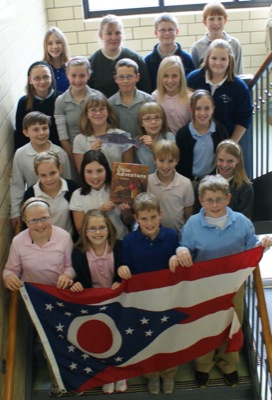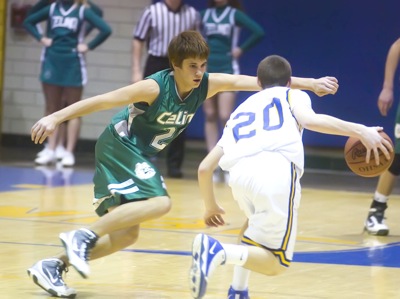Thursday, January 21st, 2010
St. Marys school innovation draws national interest
By Janie Southard

Photo by Janie Southard/The Daily Standard
St. Marys City Schools Technology Coordinator Kyle Menchhofer works with a Mobile Learning Device and a Redfly (dummy keyboard/screen for the MLDs). Fifteen of the devices were donated to the district by the Veterans of Foreign War Post 9289 in St. Marys.
ST. MARYS - There's no texting or chatting with friends on the cell phones several hundred students carry every day, but the devices are vital to the third- through sixth-graders who have them. The handheld mobile computers are an intricate part of the school's curriculum and they are drawing national notice.
Once called smartphones or PDAs (personal digital assistants), the Mobile Learning Devices were a pilot program last year in the St. Marys district. This year, the MLDs have been integrated into almost all subjects and many groups throughout the nation have come calling for information on the innovation. The attention is keeping district technology coordinator Kyle Menchhofer busy with state officials, fellow educators and industry professionals.
"Everyone's concerned about spending money on something like this. I talked to John Adams (R-Urbana) who was here last week and he agreed that the state is getting ready to cut funding to education. I said, 'you just can't do that.' There's got to be a way to step back," Menchhofer told the newspaper earlier this week.
"The money we're spending is helping our students. It's one-on-one technology (with the MLD). Finally, we're not labeling kids. We've leveled the playing field with this technology," he continued, adding he wants Adams and other state government officials who visit to go back to Columbus with first-hand knowledge of how this program is helping students.
The MLDs are free to St. Marys' 630 students through grants and donations from suppliers. The uses are many, varied and expanding almost daily, according to Menchhofer. Art projects such as cartoons with narrative, math assignments, reading, science and research are just a few of the applications. Students complete their homework and "sync" it to the teacher's software. The teacher then grades it, makes comments, etc. and sends it back to the student. Menchhofer's goal is to provide students through senior year with a device.
Verizon provides free monthly service to the district, and he's had several requests from the community about making donations. The Community Foundation also has taken the Mobile Learning Education Organization under its 501(c)3 umbrella, making donations a tax write-off.
"The foundation is doing the paperwork, the bookkeeping so the (district treasurer) doesn't have to add that to all he does," Menchhofer said. "We're also looking for money toward the broadband (Internet) charges."
The Ohio State University is a new partner and has given the project a boost.
Not only is OSU's engineering department interested in writing programs for the MLDs, the university and Verizon are coordinating efforts to host an MLD conference for superintendents, curriculum directors and technology people this year in Lima.
"They want to have it in the Ford training facility in May. A big focus is that there will be no charge (to those attending). That way, there's no burden on the school districts. They just need to give folks the day to attend," he said.
Menchhofer is excited about the impact MLDs are making on education, including teachers. He said the local staff is "excited about the MLDs" and is often staying after school to work on lesson plans. A couple of teachers are writing lessons to be published.
What makes him most happy is the students' mindset about the program. "The kids are always finding new ways to do things and the teachers appreciate learning from the kids," he said.
Nancy Wolfe, a longtime teacher at West Elementary School, told a film crew making a documentary at the school that the MLD program provides teachers with opportunities for the future and a chance to get back to why they chose teaching.
"I am a teacher because I am a lifelong learner. I think that's why most of us go into education," Wolfe said.



